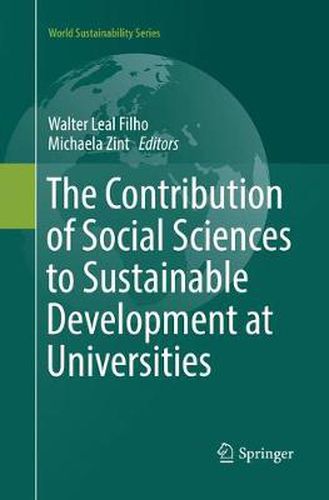Readings Newsletter
Become a Readings Member to make your shopping experience even easier.
Sign in or sign up for free!
You’re not far away from qualifying for FREE standard shipping within Australia
You’ve qualified for FREE standard shipping within Australia
The cart is loading…






This title is printed to order. This book may have been self-published. If so, we cannot guarantee the quality of the content. In the main most books will have gone through the editing process however some may not. We therefore suggest that you be aware of this before ordering this book. If in doubt check either the author or publisher’s details as we are unable to accept any returns unless they are faulty. Please contact us if you have any questions.
This volume is the first of its kind to present contemporary, state-of-the-art examples of how social science theories, models, and findings can advance all aspects of campus sustainability, an area that has so far been largely neglected. The individual chapters reflect the broad diversity of research on sustainable campus development conducted within and across basic and applied social science disciplines, drawing on a range of methods and case studies from around the world. Institutions of higher education have been among the leading promoters of sustainable development. However, efforts to transition to sustainability have been largely dominated by technological solutions and universities and colleges are increasingly recognizing that this transition cannot be achieved without attention to the human dimension. Administrators, campus sustainability officers and other university staff, faculty members and students, as well as alumni and external constituents all help to shape which sustainability innovations and initiatives are considered and pursued, and their participation determines the ultimate success of sustainability efforts. The book’s individual contributions illustrate how the social sciences can broaden visions of what may be possible, identify the advantages and disadvantages of different instrumental and emancipator approaches, evaluate interventions’ effectiveness, and offer processes for learning from mistakes and successes in ways that support continuous advances toward sustainability. Given that the majority of social science research stems from universities, the level of trust in these institutions, and their mission to develop societal leaders, higher education institutions are ideally suited for testing, assessing and modeling the social innovations needed to achieve sustainability on campuses and beyond.
$9.00 standard shipping within Australia
FREE standard shipping within Australia for orders over $100.00
Express & International shipping calculated at checkout
This title is printed to order. This book may have been self-published. If so, we cannot guarantee the quality of the content. In the main most books will have gone through the editing process however some may not. We therefore suggest that you be aware of this before ordering this book. If in doubt check either the author or publisher’s details as we are unable to accept any returns unless they are faulty. Please contact us if you have any questions.
This volume is the first of its kind to present contemporary, state-of-the-art examples of how social science theories, models, and findings can advance all aspects of campus sustainability, an area that has so far been largely neglected. The individual chapters reflect the broad diversity of research on sustainable campus development conducted within and across basic and applied social science disciplines, drawing on a range of methods and case studies from around the world. Institutions of higher education have been among the leading promoters of sustainable development. However, efforts to transition to sustainability have been largely dominated by technological solutions and universities and colleges are increasingly recognizing that this transition cannot be achieved without attention to the human dimension. Administrators, campus sustainability officers and other university staff, faculty members and students, as well as alumni and external constituents all help to shape which sustainability innovations and initiatives are considered and pursued, and their participation determines the ultimate success of sustainability efforts. The book’s individual contributions illustrate how the social sciences can broaden visions of what may be possible, identify the advantages and disadvantages of different instrumental and emancipator approaches, evaluate interventions’ effectiveness, and offer processes for learning from mistakes and successes in ways that support continuous advances toward sustainability. Given that the majority of social science research stems from universities, the level of trust in these institutions, and their mission to develop societal leaders, higher education institutions are ideally suited for testing, assessing and modeling the social innovations needed to achieve sustainability on campuses and beyond.